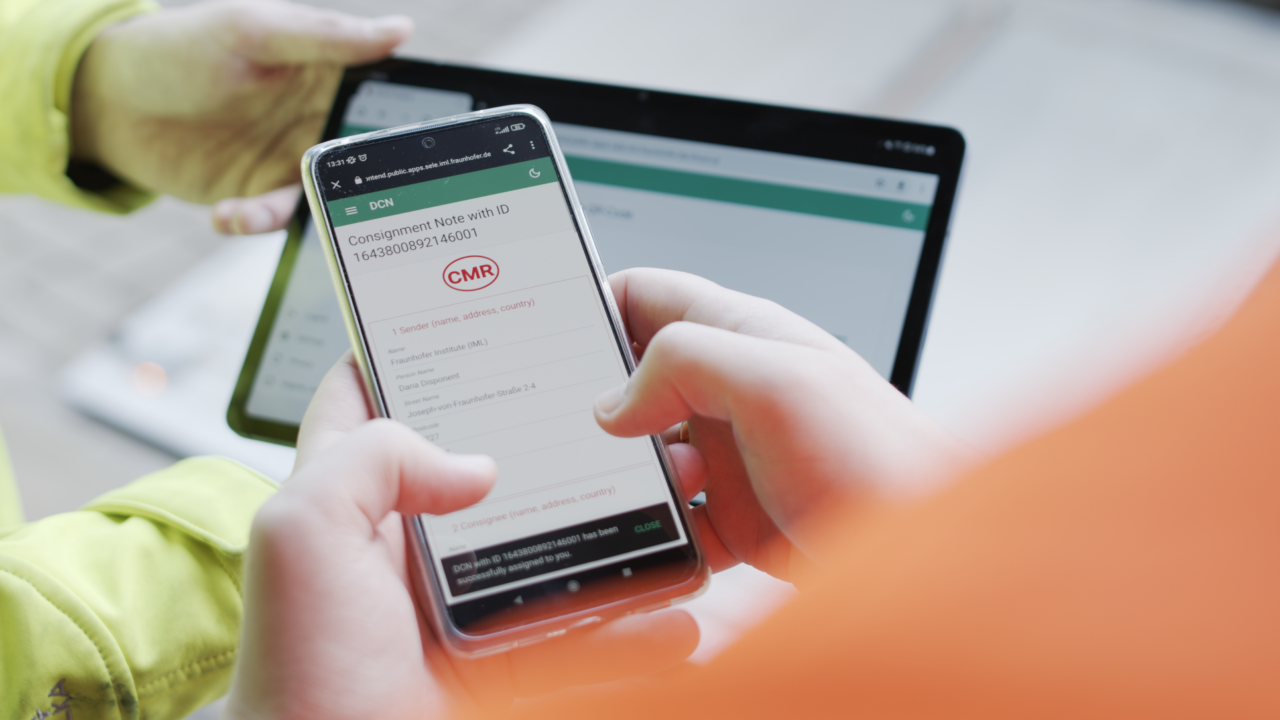With the release of the first open source components from the »Silicon Economy« project, the logistics operating system for the platform economy of the future is taking shape. The Federal Ministry of Digital Affairs and Transport (BMDV) is funding the project with 25 million euros. From now on, companies can use freely available software and hardware and adapt them to their needs.
The Fraunhofer Institute for Material Flow and Logistics IML has initiated the next stage of digital networking in logistics in the »Silicon Economy« project: On April 7, 2022, the researchers provided the results of the software and hardware developments from a total of five development projects in a digital library, the so-called repository, of the Open Logistics Foundation. The foundation aims at anchoring open source in logistics. The source code of the developments is now freely available and can be further developed by companies and adapted to their specific needs.
»We want to make our country more modern and more digital. With this project, we are setting new international standards for logistics. Our goal is to digitalize all business processes along the supply chain – from ordering and transport planning to invoicing. Germany takes a pioneering role. With the digital library of the Open Logistics Foundation, we are opening up our collected data to companies worldwide. With digitized import processes, we increase predictability, reduce bureaucracy and cut transport costs«, says Dr Volker Wissing, Federal Minister for Digital Affairs and Transport.
Prof. Michael ten Hompel, Executive Director of the Fraunhofer IML, emphasizes: »With our Silicon Economy project, we have set out to build something like Linux for logistics. The first foundation for a new type of decentralized platform ecosystem in logistics has now been laid with the publication of our first open source components. Logistics is increasingly determined by digitalization and artificial intelligence. Now it will be decided who will lift the much-cited data gold and be the first to launch the right algorithms. With the Open Logistics Foundation, we have an environment in which interfaces and basic processes become standardized and useable, and in which an open, federated and sovereign data space emerges. Companies can now develop intelligent solutions towards digital consignment notes or tracking of pallets. Companies are already changing their way of thinking: They know that a joint effort is needed and that open source is indispensable for the digitalization and automation of logistics. We are therefore convinced that the ecosystem of providers and users will grow rapidly.«
The research project started in May 2020. It runs for three years and is funded by the BMDV with 25 million euros. By publishing the components from the project in the repository of the Open Logistics Foundation, a technology initiative of leading, global logistics companies, Fraunhofer IML is counting on rapid industrial use. The establishment of the foundation at the end of October 2021 goes back to an initiative of the institute within the context of the project. „We are now looking forward to welcoming committed developers in corporations as well as in medium-sized businesses, small companies and start-ups. We invite them to test, adapt and further develop our research results. I am sure that this will make possible many innovative, creative applications in logistics in the near future that we perhaps cannot even imagine today,« says ten Hompel.

In the coming weeks and months, more components from the Silicon Economy will be added to the repository. The industry partners of the Open Logistics Foundation, too, are now starting their own projects, the results of which will be made freely available via the repository. Interested parties can access the Open Logistics Foundation’s repository via the following link: https://git.openlogisticsfoundation.org/.
For the time being, there will be one session within the context of an eight-part digital event series at the end of April in which experts from the »Silicon Economy« and the Open Logistics Foundation will give interested companies an insight into the repository. In the other sessions, they will go more into detail about the various published components. Registration at: www.silicon-economy.com/deep-dive-os.
Overview of published components
- Published components include, for example, a service for generating, storing and sharing digital consignment notes in a format which can be read by humans and machines, designed considering established templates and international standards mind and implemented as a reference implementation. Further components offer solutions for the integration of IoT devices and the preparation of data for use by other services as well as for the digitalization of import processes in airfreight fresh logistics.
- The software library of the »IDS Integration Toolbox« also simplifies the integration of components for the International Data Spaces (IDS) into IT systems. Small and medium-sized enterprises in particular benefit from this: They no longer have to rely on specialists with specific knowledge of the IDS reference architecture model to connect to the secure data spaces.
- All components are published under the free Open Logistics License, which takes into account European liability and copyright law.